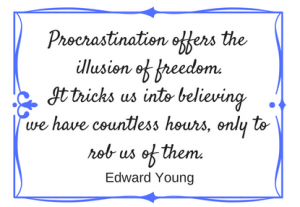I try to take one day at a time, but sometimes several…

Procrastination Stress — Get Rid of It for Good! (Pt. 1 of 3)
3.
Procrastination Stress — Get Rid of It for Good! (Pt. 1 of 3)
On a regular day, do you tend to – –
Start your work with the easier tasks rather than the more difficult ones?
Choose pleasurable activities over the tasks that are more important?
Leave an item on your To-Do list long after it should have been done?
If you find yourself indulging in such behaviors, then you are procrastinating. Many people do this from time to time. On the other hand, if your regular way of doing things, then you are a chronic procrastinator.
Procrastination is the habit of voluntarily delaying the completion of tasks.
Of particular importance to the readers of Stress Buffer is the fact that procrastination leads to stress. In this article, we address procrastination stress, as it applies to both the occasional and the chronic procrastinator.
What you will learn in this post:
- How prevalent procrastination is across global societies
- How common behaviors lead to procrastination stress
- 4 subtle forms of procrastination you might not notice in your behavior
- 4 remedies to prevent procrastination
The Facts
Whether you occasionally procrastinate or chronically procrastinate, take comfort: You’re not alone!
One in five people falls into the category of procrastinators.
The 10th Procrastination Research Conference (Chicago, 2017) gathered researchers, from across the globe, who have been studying the phenomenon for decades. They reported that this 20% figure applies to societies all around the world: from the U.S. to Peru, Saudi Arabia, Germany, Japan and many more countries.
That makes for quite a lot of stress, chronic or otherwise, on our planet!
What Is Procrastination Stress?
Procrastination is a common, even pervasive, source of stress in contemporary society.
You may ask: “Why? So you relax for a while. You do what you like. Isn’t relaxation the opposite of stress?”
It’s the consequences, my man. The consequences.
That’s the sneaky part about procrastination.
Remind yourself: All good things must be monitored, even relaxation.
Think about when you decided, “I’ll get to that later. Right now, I’m going to do something I like.”
You knew you had to complete that certain task. Yet you kept putting it off in favor of a preferred pastime. Then, uh-oh — deadline approaching! Stress building!
All these “putting off” activities are avoidance behaviors — the psychologists’ term for indulging in alternatives you prefer, in lieu of what you know you should do. The downside emerges as the deadlines close in — reality check, regret and procrastination stress. No surprise.
I’ve heard that 99% of the time, people feel regret after they have procrastinated. True or not, procrastinating leaves people less time to complete what they know they should have started earlier.

Procrastination causes delays. Sooner or later, tension, worry, and other manifestations of stress set in. Now you have to cram at the eleventh hour. Cramming is a high-adrenaline state that leads to even more stress.
So, procrastination, directly or indirectly, is a stressor on your mind and body. We call this procrastination stress.
Why people procrastinate
People everywhere, no matter how intelligent, bring procrastination stress upon themselves. Why?
If you want to beat the habit of procrastination, you must understand why you are prone to procrastinate. Following are the four main causes. See if you identify with any of them when you procrastinate.
1. Discomfort
Discomfort may be mental, emotional, or physical.
 Mental: “I can’t do this. It takes too much brain power.”
Mental: “I can’t do this. It takes too much brain power.”
Emotional: “I don’t feel like it” takes precedence over goals.
Physical: “I get a headache just thinking about it.”
Can we agree: Any valuable endeavor or activity is likely to involve some level of discomfort?
Getting out of our comfort zone — exerting effort and expending energy, usually is necessary to produce a meaningful outcome.
If you have a low threshold for discomfort, you probably would resort to an avoidance behavior.
Most of the time, people are unaware of their threshold for discomfort. Yet it operates at the unconscious level, where the desire to avoid discomfort drives their choice.
Remedy: Stay self-aware. When you are aware of how your mind is operating, you can control it. A good self-awareness question to ask yourself regularly: “Is this the best use of my time at this moment?”
2. Fear of a Fiasco
A scary experience! When a person fears failure, he may imagine the worst possible outcome. The thought of falling short of his standard triggers an array of mental and emotional discomforts. The fabricated fear then becomes an excuse for procrastinating.
Some adults are so afraid of failing they will postpone an activity indefinitely. The mental trigger: Not tackling a task at all becomes better than falling short on performance
Fear of failure often goes hand-in-hand with perfectionism. Psychologists observe that an individual who fears his work will be less than perfect is more likely to procrastinate.
If you are a perfectionist or know someone who is, share this thought.
Certainly, you want to do your best. But did you know:
Creative people are rarely 100% satisfied with their work. For example, the greatest performing artists routinely reflect on what they could have done better – irrespective of the adulation of their audience.
Remedy: Do your best during the allotted time, accept it and move on. Operate on the adage, “Perfection is in the eye of the beholder”
3. Fear of Rejection or Censure
Many brilliant contributions have been stifled due to fears. When a person fears disapproval or criticism of others, particularly an authority figure, he may procrastinate. Sadly, this person’s self-evaluation pales behind an outsider’s valuation.
 For example, a person at a business meeting may withhold a great idea for fear that others will think it foolish. Or a person wants to take singing lessons but may procrastinate because others think he has no sense of pitch or rhythm.
For example, a person at a business meeting may withhold a great idea for fear that others will think it foolish. Or a person wants to take singing lessons but may procrastinate because others think he has no sense of pitch or rhythm.
The fear of rejection can extend procrastination stress indefinitely, even for a lifetime.
Remedy: Anything worth doing attracts admiration and criticism. Get your mind off yourself and onto the business at hand.
4. Resistance Due to Indignity: Why should I have to do it?
In the workplace, people sometimes find themselves weighed down with tasks beyond their own assignments. Perhaps an event, previously unscheduled, suddenly requires special preparations. Or perhaps one is called upon to ease the workload of a less capable colleague. In any case, the individual may be resistant to take on an unfair share of additional work.
Rather than communicating the indignity of the request, he reluctantly accepts responsibility. Resentment shoves the task down to a very low priority.
Yet, as the inevitable deadline approaches, frustration, anger and procrastination stress add to resentment. Lots of stress!
Now, the mental resistance to the task, coupled with the time squeeze to get it done, intensifies the stress effect.
Remedy: Deal with the unfairness upfront or else, bite the bullet: Do the task and move on.
The Takeaway:
All these attitudes and avoidance behaviors are self-defeating. However, they are just habits. The good news is we can change habits. With a little help, you are able to direct yourself to your most productive and rewarding behaviors.
Read on in the next post to learn how to sway your mindset so you are never tempted to procrastinate.
Vent here …
Sometimes the best way to free yourself of a bad habit is to vent your feeling about it.
Feel free to unload (scroll down).
10 Stress Habits and Alternatives!
If not, click here





Everything is very open with a really clear explanation of the challenges. It was really informative. Your site is very useful. Many thanks for sharing!
Spot on with this write-up, I truly believe this site needs a lot more attention. I’ll probably be back again to see more, thanks for the advice!
I was very pleased to uncover this web site. I need to to thank you for ones time due to this fantastic read!! I definitely savored every little bit of it and i also have you book marked to check out new things in your site.
I was able to find good information from your content.
I was very pleased to find this great site. I wanted to thank you for your time due to this fantastic read!! I definitely liked every bit of it and i also have you book marked to check out new information on your web site.
I enjoy reading through an article that can make men and women think. Also, many thanks for allowing me to comment!
Hi! I just would like to offer you a huge thumbs up for the excellent information you’ve got here on this post. I’ll be coming back to your site for more soon.
Saved as a favorite, I love your web site!
I was very happy to discover this great site. I need to to thank you for your time for this fantastic read!! I definitely enjoyed every part of it and i also have you saved to fav to look at new things in your site.
You are so interesting! I don’t believe I’ve truly read anything like that before. So good to discover another person with a few original thoughts on this subject matter. Really.. thank you for starting this up. This web site is one thing that is needed on the internet, someone with some originality!